With the purpose of generating deep reflections on how to contribute, from a perspective of pastoral action, to the care of the
of life and territory and the construction of a true and lasting peace, IRI-Colombia held a discussion on the challenges of peace in Colombia and the peace negotiations that are taking place in our country on November 20.
“This space is especially relevant for the leaders present, who face the direct impacts of the conflict in their territories, particularly in regions such as the Amazon, where violence, illegal deforestation and forced displacement are daily realities,” Blanca Lucía Echeverry, national coordinator of IRI-Colombia, told the 17 religious leaders of Caquetá. Guaviare, Meta, Putumayo and Bogotá had the opportunity to witness this important conversation between Camilo González Posso, coordinator of the government delegation at the peace dialogue table with the FARC General Staff, and Humberto Martín Shikiya, delegate of the World Council of Iglesias at the negotiating table.

During the panel, the experts addressed the advances, challenges and prospects of the peace process in Colombia and the challenges for its implementation in the most affected regions such as the Amazon. “The Government proposes an alliance with the communities to make effective transformations in the territory. To this end, we have been developing what we have been developing which has been called social dialogues,” said Camilo González Posso, who is also president of the Institute for Peace Development Studies (INDEPAZ), about the Colombian State’s strategies to build the trust of the affected communities and guarantee their active participation in the peace process.
Additionally, the expert on reconciliation and peacebuilding in Latin America, Humberto Martín Shikiya, referred to the transformative role of communities in the reconciliation of countries like ours. “In some ways, the role of churches has always been to contribute
to overcome political circumstances, to strengthen democracy and to generate peaceful coexistence, based on memory, truth and justice. Reconciliation has to do with these three concepts,” he concluded.

Click here to read the full Spanish edition of the November IRIboletín.


